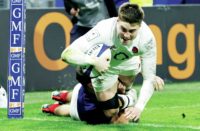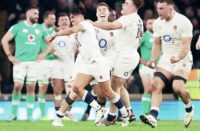 Last week's letter to the paper from Tom Taylor-Woodward asking for reassurance that clubs were enforcing the salary cap appeared to be answered in full by Phil Winstanley, the rugby director of Premier Rugby (PRL) in the same issue – but I'm not sure it was.
Last week's letter to the paper from Tom Taylor-Woodward asking for reassurance that clubs were enforcing the salary cap appeared to be answered in full by Phil Winstanley, the rugby director of Premier Rugby (PRL) in the same issue – but I'm not sure it was.
Winstanley was reacting to Mark Cueto's widely reported comments that it was blatantly obvious that some clubs were breaking the cap and said that he had spoken to Cueto and that he had no ‘hard evidence' of any breaches.
Given that Premiership Rugby has a range of possible sanctions that Winstanley outlined and they can be brought into play up to five years after any reported event, it is highly unlikely that any club that overspent would do it in such a way that could easily be proven.
It is unlikely that any club that sets out to breach the wage cap would do so by directly paying a player a high salary, simply because the PRL annual audit would immediately expose any such breach.
The Premiership clubs' salaries for established star players are part of the price of attracting a good crowd but it is also the cause for much of the speculation that surrounds wage cap abuse.
The suspicions of fans and players are, as Winstanley says, ‘anecdotal' but given the size of the squads needed by Premiership clubs to cover for all eventualities, plus the number of ‘star players' that some clubs have, it would seem virtually impossible for those clubs to keep within the cap.
I also believe that the formal whistle-blowers procedure is unlikely to be of much use as there will probably be nothing in the accounts that would show any ‘additional earnings' such as promotional work, corporate entertaining or even sponsorships. All these are legitimate ways in which a player can boost his/her income outside the salary the club pays for playing the game.
It's not easy for clubs who want to employ the best players, even though the Unions pay the clubs for player release for international matches, but PRL does not allow clubs to off-set the extra cost of employing international players against the wage cap.
This begs the question: What would happen if a player is unexpectedly called into the England or any other country's international squad and then capped?
I would expect that any agent worth his salt would, when negotiating contracts with a club for talented young players, ensure that a clause was included that would increase earnings should the player be capped.
As a result, a club could start the season within the wage cap then (through no fault of their own) fall outside it, as their players gain international recognition. But that is not the case in those clubs that sign established or past international players.
The clubs do have the right to exclude a marquee signing from their wage cap, but I would have thought it is highly unlikely that a club with substantial star players would be paying the ‘marquee' a significantly different salary.
Obviously this is speculation on my part and, as Winstanley said, is purely anecdotal without any hard evidence.
The announcement of an England squad always makes my pulse quicken with the expectation of the games ahead.
Whether Six Nations or Autumn Internationals, the naming of a new squad brings with it a sense of anticipation of what might be and a hope for an England team that will at last live up to the hype that now seems to follow all international sides.
The uncertainty factor brought into this squad by the injuries to a number of established players is exciting, as it gives the team the chance to take a big step forward in developing a more complete game.
The failure of the squad to improve on the early developments made when Lancaster and his management team took control has largely been down to the failure of that team to find a balanced style of play.
Too many areas of the side have remained unbalanced with utility players, rather than specialists, and power, rather than skill, holding sway in selection.
Latterly, Lancaster has favoured a team with two full-backs and only one wing and with the squad combinations of three wingers (Chris Ashton, Christian Wade and Marland Yarde) and three full-backs (Mike Brown, Ben Foden and Alex Goode) that looks set to continue.
The centre combination of Brad Barritt and Manu Tuilagi, although both good individual power players, has failed to deliver a balanced partnership but with five new centres (three uncapped) the combination possibilities are endless and for me a Billy Twelvetrees/Joel Tomkins partnership could be the one to watch.
The same can be said of the back row, where the compromise of utility over specialist has included the captain, it remains to be seen if there will be any change in this area.
However, the one player that I think is most important to how England fare this autumn is Alex Corbisiero.
Corbisiero's form for the Lions reinforced his importance to this England squad, following the disappointments of last season when he wasn't included because of injury.
The hope now is that he recovers fully from his current injury in time to play some part in this autumn's games.


























